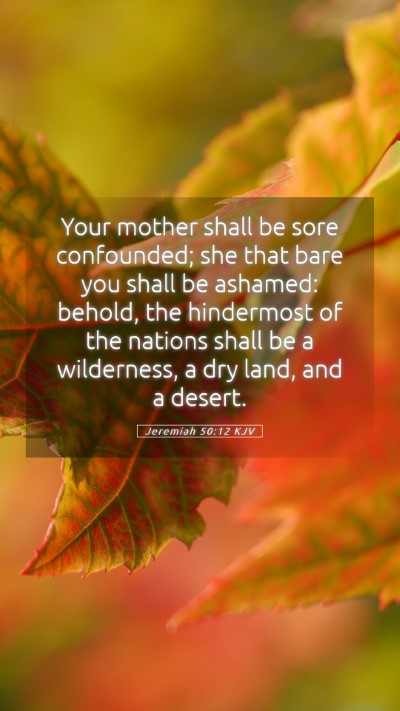Bible Verse Meaning and Commentary on Jeremiah 50:12
Jeremiah 50:12 (KJV): "Your mother shall be sore confounded; she that bare you shall be ashamed: behold, the hindermost of the nations shall be a wilderness, a dry land, and a desert."
This verse from the book of Jeremiah serves as a powerful declaration of the impending judgment upon Babylon, viewed as a mother nation symbolizing the source of distress and sin for its people. The profound meanings encoded within this verse involve multiple themes of shame, desolation, and the consequences stemming from national rebellion against God.
Summary of Insights from Public Domain Commentaries
The insights from esteemed commentators like Matthew Henry, Albert Barnes, and Adam Clarke provide a deeper understanding and interpretation of this text:
-
Matthew Henry's Commentary:
- Mother Confounded: Henry emphasizes the metaphor of Babylon as the mother of nations, whose disgrace represents the ultimate failure of power and pride. This disgrace not only brings shame upon Babylon but is indicative of God's judgment against nations that oppose Him.
- Desolation and Wilderness: The imagery of desolation refers to the complete annihilation of its glory and prosperity, illustrating that judgments from God lead to stark realities where once there was vibrance and life.
-
Albert Barnes' Notes:
- Historical Context: Barnes discusses how this verse is set within the larger context of Babylon's downfall. As a prominent empire, Babylon's eventual destruction serves as a warning to all nations and civilizations that stand against divine principles.
- Symbolism of the Desert: The phrase "dry land and a desert" captures the transformation from a prosperous city to one that is barren, showcasing the futility of earthly systems without God’s favor.
-
Adam Clarke's Commentary:
- Spiritual Reflection: Clarke provides a spiritual reading of this verse, noting that those who disregard God and live in sin will ultimately face desolation. Babylon represents not just a physical location, but also a state of rebellion against divine order.
- Shame and Regret: He highlights how the shame experienced by Babylon's mother symbolizes the broader consequences of sin, prompting individuals and nations to reflect on their relationship with God.
Understanding the Verse: Key Themes
This verse encapsulates profound theological insights relevant for Bible study groups, online Bible study, and individual reflection. Here are key themes derived from this verse:
- The Consequence of Sin: Sin inevitably leads to desolation, whether at an individual or national level. This truth transcends time, urging readers to reflect on their lives and communities.
- The Nature of Divine Judgment: God’s judgment can seem distant but is always imminent for those who continue in rebellion. The historical context provided by commentators enriches our understanding of how God's justice operates within nations.
- Shame and Restoration: While shame is a powerful theme, this passage also invites the faithful to consider how humility and repentance can lead to restoration.
Application of Jeremiah 50:12 in Daily Life
Application of this verse can be found in:
- Individual Reflection: Encouraging believers to assess their lives against the standards of God’s word and recognize areas needing change.
- Community Accountability: Promoting discussions in Bible study groups about collective ethical living in line with scripture.
- Historical Lessons: Understanding the historical failures of nations can guide modern societies in their moral and ethical choices.
Cross References
Several verses echo the themes and context presented in Jeremiah 50:12:
- Isaiah 13:19: This verse parallels with the description of Babylon's destruction and the resulting desolation.
- Revelation 18:2: This New Testament verse emphasizes the fall of Babylon, serving as a prophetic fulfillment of Jeremiah's prophecy.
- Lamentations 1:8: This verse reflects on the shame and disgrace associated with sin, aligning with the sentiments found in Jeremiah 50:12.
Conclusion
In sum, Jeremiah 50:12 offers a rich tapestry of meanings and interpretations that encourage both individual reflection and communal accountability. The insights provided by Matthew Henry, Albert Barnes, and Adam Clarke together urge readers towards a deeper understanding of scripture, shedding light on the nature of sin, judgment, and the path to redemption in the context of biblical history.
This responsibility lies in understanding Scripture profoundly, as it affects not only personal spirituality but also broader societal values.


